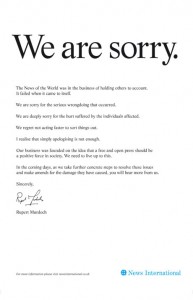 Most of today’s newspapers in the UK carry a full-page advert by News International in which they apologise for the phone hacking scandal. For what it’s worth, I think that Rupert Murdoch’s contrition is genuine, and I’m inclined to believe that he, too, is truly shocked at what has been going on in some of his titles. Not that that will save him, of course, now that the British public is engaged in one of their periodic fits of morality.
Most of today’s newspapers in the UK carry a full-page advert by News International in which they apologise for the phone hacking scandal. For what it’s worth, I think that Rupert Murdoch’s contrition is genuine, and I’m inclined to believe that he, too, is truly shocked at what has been going on in some of his titles. Not that that will save him, of course, now that the British public is engaged in one of their periodic fits of morality.
The real problem with News Corporation isn’t that it’s run by bad people, or engaged in particularly bad behaviour by comparison with others. On the whole, I think I’d rather have Rupert Murdoch owning my newspaper than former pornographer Richard Desmond, for example. And we already know that News International is nowhere near the worst offender when it comes to obtaining material by unlawful means. Elsewhere in the world, where News Corporation is the outsider, it has a much better reputation. Take Italy, for example, where NewsCorp is the only serious challenger to Silvio Berlusconi’s media oligopoly.
No, what’s wrong with News Corporation is that it’s simply too big. Power corrupts, as the saying goes, and the greater the power the greater the likelihood of corruption. That’s why media plurality matters; not just for the sake of competition and customer choice but so that different publishers can hold each other to account. And that’s why it won’t hurt for News Corporation’s wings to be clipped a bit right now.
In the long run, though, this isn’t really about News Corporation. It’s about our attitudes to the news media as a whole. The underlying cause of the hacking scandal is the simple fact that we’ve been too tolerant of shoddy journalism and too hungry for gossip rather than news.
Knee-jerk responses calling for stricter privacy laws and more severe punishment for those who engage in the likes of phone hacking are not only missing the point but could also lead to distinctly undesirable side-effects. Investigative journalism often relies on subterfuge; without it we wouldn’t have known about things like the FIFA corruption scandal, for example. The News of the World was actually pretty good at this; it broke many stories that were entirely in the public interest.
Where subterfuge and sailing close to the legal wind becomes wrong is where it is used solely to feed the appetite of the public for gossip or simply to scoop the rest of the media. There was no public interest, for example, in accessing Milly Dowler’s voicemails. And, while I’m of the opinion that newspapers should be free to report the wrongdoings of celebrities when they discover them, there is a clear – and important – difference between reporting something you are told and deliberately aiming to dig it out.
What I’d like to see, therefore, is not more laws, or stronger laws, or more prosecutions of journalists who break existing laws. What the media needs is a regulator which is both truly independent (unlike the existing PCC, which is dominated by the the newspapers themselves) and has real teeth. I’ll maybe cover that in more detail later, in a separate article.
